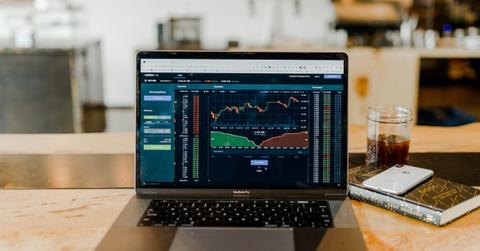You’ve Seen ‘RR’ Mentioned on WallStreetBets, but What Does It Mean?
Another day, another acronym on WallStreetBets. What does "RR" stand for in the stock market?
Sept. 9 2021, Published 7:44 a.m. ET

Ever wondered what "RR" stands for in the stock market? The acronym could be referring to a number of things, depending on the context. Some possibilities are the risk/reward ratio, registered representative, and reserve ratio.
The WallStreetBets community behind the rise of GameStop and AMC Entertainment stock is a mystery to many, and the terminology that the forum's retail traders throw around doesn’t make anything clearer.

Risk/reward ratio
When trading stocks, there's always some risk involved. Therefore, investors should always determine the potential risk and reward before trading, or the risk/reward ratio. It's sometimes also called the "R/R ratio."
The R/R ratio is used to evaluate a trade’s potential profit (reward) in relation to its possible loss (risk). To compute the ratio, you need to first determine the difference between a trade's entry point and the stop-loss order. This is the "risk" portion of the ratio. Then, you calculate the difference between the target profit and the entry point, the "reward" portion of the ratio. The R/R ratio is calculated by dividing the risk by the return.
An R/R ratio of 1:5 indicates that an investor is willing to risk $1 in exchange for the possibility of earning $5. The ratio indicates whether the potential risk is greater than the possible reward. This can assist investors in deciding whether to go ahead and trade.

Reserve ratio
The reserve ratio, sometimes known as the "cash reserve ratio," is the percentage of total deposits that commercial banks are required to keep with the central bank in the form of cash reserves, as well as accessible for commercial lending. The reserve ratio requirement is set by the country’s central bank, which, in the U.S., is the Federal Reserve. Therefore, if the Fed were to determine that the reserve ratio is 10 percent, it implies that if a bank has $10 million in deposits, it's required to have $1 million on reserve ($10 million × 0.10 = $1 million).
The reserve ratio plays a vital role in regulating the supply of money in the economy, in that the central bank will lower the reserve ratio to increase the money supply. Commercial banks will have additional funds to disburse as loans to boost the supply. On the other hand, to control inflation, the reserve ratio is typically increased, reducing the lending power of banks and lowering the economy’s money supply.
Registered representative
Registered representatives are individuals authorized to purchase and sell securities on behalf of customers. They're sponsored by a company registered with the Financial Industry Regulatory Authority (FINRA). Stockbrokers, financial advisors, and portfolio managers are all examples of registered representatives.
Registered representatives represent customers in the trading of investment products such as stocks, mutual funds, and bonds. They deal with complicated trades or complex investment products that are outside the scope of online trading. Registered representatives are well versed in the markets and look for the best possible securities and prices so that they can advise customers on what and when to buy and sell. In return, they charge a fixed fee or percentage of the transaction value as a commission.
